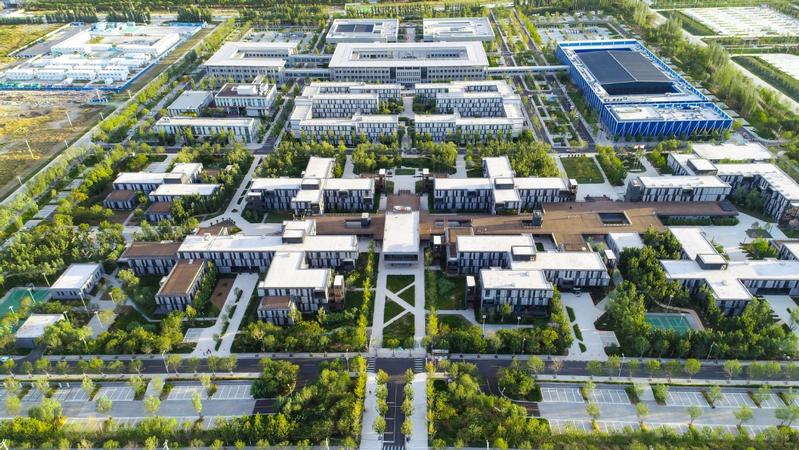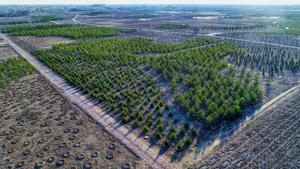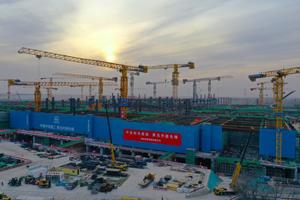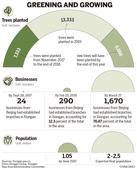Progress is increasingly evident as the project celebrates its third anniversary. Zhang Yu reports from Xiongan New Area, Hebei.
 An aerial view of the Xiongan Citizens' Service Center, a major infrastructure project in Xiongan New Area, Hebei province. (MAO HERAN / FOR CHINA DAILY)
An aerial view of the Xiongan Citizens' Service Center, a major infrastructure project in Xiongan New Area, Hebei province. (MAO HERAN / FOR CHINA DAILY)
Sitting in a car on the roadside and looking at the scenery around Xiongan New Area, Hebei province, one could see the answer to a frequently asked question, "How is the new economic engine near Beijing looking now?"
On both sides of a highway, vast stretches of land were dotted with construction projects.
The temperature was a comfortable 17 C and a mild spring wind was blowing, but Gao Jianxun was sweating profusely after walking around a forest for two hours.
After checking thoroughly for potential sources of forest fires, he removed his jacket and started cutting withered branches from a pine tree.
These are daily tasks for the 51-year-old ranger, who works in the managed forest in the economic area, which was founded three years ago about 100 kilometers southwest of Beijing.
Established in April, 2017, Xiongan New Area is a key step in the country's regional development strategy for Beijing, Tianjin and Hebei. The neighbors have undergone coordinated development for six years in total.
"Xiongan is now at a stage of substantive construction and should speed up the construction of key projects," Xu Qin, governor of Hebei, said during an inspection tour of the area on Monday.
 Villagers row a boat on Baiyangdian Lake in Xiongan New Area, Hebei province. (MAO HERAN / FOR CHINA DAILY)
Villagers row a boat on Baiyangdian Lake in Xiongan New Area, Hebei province. (MAO HERAN / FOR CHINA DAILY)
The importance and special nature of Xiongan can be seen and felt through the words and work of people across the area, from top officials to grassroots workers.
Last year, Wang Dongfeng, Party secretary of Hebei, made at least one inspection tour to the area every month to underline the fact that every project underway in Xiongan must be of the highest quality, Hebei Daily reported.
The Party chief normally works and lives in Shijiazhuang, the provincial capital, about 160 kilometers southwest of the new area.
When Xiongan was established, it was given a national significance similar to economic engines such as the Shenzhen Special Economic Zone in Guangdong province and Shanghai Pudong New Area, according to a government guideline on the development.
On Jan 15, the government released a detailed development plan of the first area constructed in Xiongan.
The plan said the area will be developed into an important part of a world-class cluster in the Beijing-Tianjin-Hebei region as a new engine of the modern economy and a national model of high-quality development.
 Qiannianxiulin, or Millennium Forest in Xiongan New Area, Hebei province. (MAO HERAN / FOR CHINA DAILY)
Qiannianxiulin, or Millennium Forest in Xiongan New Area, Hebei province. (MAO HERAN / FOR CHINA DAILY)
Excitement
Forest ranger Gao, a resident of Gaoxiaowang village in Rongcheng, one of three counties covered by the new area, said, "The blueprint for Xiongan is making us locals so excited, and our home will not be just a common village."
The other counties involved are Anxin and Xiongxian.
Transformed from a simple farmer to a participant in the establishment of the new area, Gao's pride and satisfaction at being a future Xiongan resident are evident.
The forest in which he works is called Qiannianxiulin, or Millennium Forest. The greening project was started in 2017 and so far 14 million trees have been planted across 207 square kilometers.
This year, trees will be planted across a further 67 sq km, with the different sections being clearly separated, China Xiongan, the project's operator, said.
The government guideline said the forest coverage rate in the new area will eventually be raised to 40 percent from 11 percent.
Part of the developer's task is not only to build Xiongan into an economic engine, but also to establish a livable area with a healthy environment.
In addition to the locals, many people from outside the area have arrived to take part in construction and other projects, which they regard as glorious work.
 Construction site of Rongxi Concrete Mixing Station in Xiongan. Hebei province. (MAO HERAN / FOR CHINA DAILY)
Construction site of Rongxi Concrete Mixing Station in Xiongan. Hebei province. (MAO HERAN / FOR CHINA DAILY)
Yao Zhijun, 34, a technician at Rongxi Concrete Mixing Station in Xiongan, took out his smartphone and displayed an app that showed he takes at least 20,000 steps around his workshop every day. The workshop covers 13,198 square meters, about twice the size of a soccer field.
The station is a major provider of construction materials, including concrete and pitch for projects in Xiongan.
Wang, the provincial Party chief, visited the station earlier this year and stressed the importance of it operating as a high-quality, green, energy-saving facility, because the materials it produces "directly determine the quality of various construction projects in the new area".
Last year, 67 major construction projects, such as a water-diversion facility and high-quality schools, were started in the area. Most are infrastructure facilities and projects designed to improve the local environment.
The quality requirement gives Yao an even greater sense of responsibility and makes him even more determined to excel at his job.
"We must ensure every part of the production process is of the highest standard, because, you know, it's for Xiongan," he said.
"Everyone here is determined to do a good job for the future city."
He used to work in Tangshan, Hebei, and usually returned to his home in Beijing every weekend.
However, since coming to Xiongan in September, he has only returned every month or so, even though the area is much closer to home.
Recently, though, travel restrictions introduced because of the coronavirus outbreak mean he has been unable to return home.

Like Yao, most of the people working in Xiongan, including government and company employees, are doing their part for a common goal.
They are helping to prepare the new area to receive noncapital functions from Beijing, such as operations that are not suitable for development in the capital.
Settling the new arrivals-including colleges and research institutions, medical institutes, business headquarters and financial institutions-is a major task in establishing the new area.
To encourage employees of relocated companies to remain in the new area and enjoy new lives, Xiongan has started improving public services, such as education and healthcare, in line with standards in the capital.
Since September, working groups from facilities in Beijing have been constructing a kindergarten, a hospital, and primary, middle and high schools.
The area's public service bureau has stated that the schools and hospital will be managed by four counterparts in the capital-Beijing Beihai Kindergarten, Beijing Shijiahutong Primary School, Beijing No 4 High School and Xuanwu Hospital Capital Medical University.
By Friday, 1,670 businesses from Beijing had established branches in Xiongan, accounting for 76.47 percent of the total in the area.
Contact the writer at zhangyu1@chinadaily.com.cn


